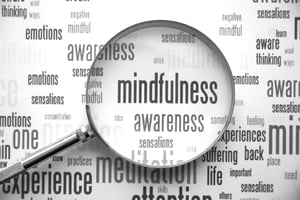Self-acceptance is the doorway to our authentic power. And when acceptance is lacking, it's one of the biggest stumbling blocks to a person’s solid sense of self and serenity. Without self-acceptance, there is no true freedom.
Mental chatter and the relentless monkey mind dismantle even the most disciplined focus. Aww... if we could only quiet the noise!
Estimated reading time: 6 minutes. Mastery—an ongoing journey.❣️
 Heartmanity is proud to partner with outstanding companies that we wholeheartedly recommend so this post may contain affiliate links. You can read our full disclosure here.
Heartmanity is proud to partner with outstanding companies that we wholeheartedly recommend so this post may contain affiliate links. You can read our full disclosure here.
When we accept ourselves, we're able to embrace every part of ourselves unconditionally.
We can acknowledge our strengths and capabilities as well as vulnerabilities and limitations. There is an awareness of our feelings, behavior, and our impact on others. Not even our idiosyncrasies are disowned.
From Self-Loathing to Self-Empowerment and Authentic Power
The opposite of self-acceptance is self-loathing. We are unable to accept our shortcomings nor do we own our strengths. We're not comfortable in our skin. See if any of these sound familiar to you.
Are you super hard on yourself?
Do you give and give and give, but it’s never enough?
Do you pick apart and criticize your best contributions?
Have you pressed your mute button when your unique wisdom was burning inside you, wanting to be shared?
Does your day end with you rehearsing all of the things you could of, should of, or might have done or said differently?
And lastly, is your TO-DO list so long that you don’t have time to breathe, let alone relax and be. Just BE!
Who has time for "being," when there is so much to DO, right!?
In our culture, vulnerability is often seen as weakness. Vulnerability is certainly not seen as being our powerful self. And in a culture that wants convenience over meaningful contribution and conflict over connection, is it any wonder that loneliness is a modern-day epidemic.
In a society that bullies and values power over others more than power from within, it can be difficult to find our voice and to accept what can be brutally rejected by others.
"The worst loneliness is to not be comfortable with yourself."
—Mark Twain
The opposite of loneliness is acceptance and self-love.
How would your life be different if you could have regular, deep connection and inspiration that you could count on? How would your life be different if you could plug into the spirit of your true self at a moment's notice!?
Whether you know it or not, self-acceptance is critical for you.
What are the subtle ways you reject your truth and resist the longing to be true to yourself?
And whether you are aware of it or not, your thoughts and emotions control much of your energy and behavior.
Did you know that the limbic brain, considered the emotional brain, can override our rational thinking? And the decisions we make will determine our quality of life and our future. Much of our negative thought patterns and rough emotional terrain are dictated by memories that are no longer relevant.
Why? Because we're not children anymore; we've never updated what we learned as children!
Discover your authentic power in The Brain Warrior's Way course. A course based on brain science, not guesswork.
Try it now!
 So if you desire to get to know the real you and you're looking to develop acceptance of yourself, remember that one of the first steps is catching the automatic tape that plays in your head.
So if you desire to get to know the real you and you're looking to develop acceptance of yourself, remember that one of the first steps is catching the automatic tape that plays in your head.
A mindfulness practice is worth pursuing. Becoming more aware of your internal landscape is vital to begin a process of acceptance. Then we can sort old, outdated tapes with what is our truth. Standing in authentic power isn't possible without dropping the baggage of unconscious thought patterns and self-limiting beliefs that no longer serve your highest and best self.
Many people want to believe that all they have to do is repeat a bunch of affirmations to feel better about themselves. But if that were true, this would be a much happier and safer world. The fact is that if you have limiting beliefs like "I'm unworthy" "I'm not enough," or "Nothing I do is every good enough," then no amount of affirmations are going to help. Self-development is the road to freedom and inner peace.
Below is a simple, step-by-step practice to enhance your life and help you grow in self-awareness, emotional fitness, and self-acceptance.
Related reading: "How to Find Inner Peace by Resolving Conflicting Emotions."
How to Quiet Mental Chatter and Connect to Your Authentic Power
STEP 1: Identify a repetitive thought that you say to yourself continually.
It's that one that makes you feel worse about yourself. One of the favorites that I hear from clients a lot is "I should have been able to do that better." Or "It's never good enough."
STEP 2: Ask yourself, "Is what I'm saying to myself true?"
Of course, it's possible that in ideal circumstances, we could do better at any given moment. However, it's this moment.
And at this moment, you may have a sick child, and you've had only four hours of sleep. You may have just heard that your mother is terminally ill. Or you may have heard that you didn't get the job promotion you were hoping for—and put your whole being into that goal.
Whatever is true in this moment, just is. However, if we do not give ourselves compassion, stress and letdowns can cloud our best selves.
When we make ourselves wrong for what we feel, this disconnect causes more stress, stealing our inner peace.
STEP 3: If you answered, yes, then ask "How is this thought true?" If you answered no, ask "Why isn't it true?"
It's important to sort and identify what is true from what is so familiar by repetitive thoughts that we've come to believe is true.
Just because you thought it, doesn't make it TRUE!
STEP 4: Next, shift your perception to support how you would like to feel.
If what you're saying to yourself is making you feel worse, why do it!?
It's a good sign that it's coming from old limiting beliefs, unconscious patterns, and old ways of being.
Decide how you would like to feel.
STEP 5: Then, mindfully look at how you would think and feel differently to feel the way you desire.
For instance, if you don't like that you're impatient, then look at the thoughts causing your impatience. Practice being more tolerant and compassionate.
If you dislike how you procrastinate, get curious and find out the real reasons for your procrastination.
Just be sure and remove the judgment.
One more step...

STEP 6: Take one action to change the way you feel—just one!
Without action, nothing changes.
One action might be to study inspiring people who know how to make things happen. Another action could be to practice mindfulness to grow in patience. Pick just one action and practice it consistently until you can sustain it.
Maybe you've neglected getting exercise and you're feeling fat. Or you have been working long hours and telling yourself that you don't have time. Make a commitment to do yoga or even a gentle walk daily.
ACTION shifts our emotions and self-care generates self-love.
Our life is a direct reflection of our inner world. Change your thoughts, emotions, and beliefs, and your life will also change!
Commit—take a course to find your True Self.
The Brain Warrior's Way will improve your self-esteem, boost your confidence, and help you find your authentic power!
And for more information about Heartmanity coaching programs, contact us at support@heartmanity.com.








